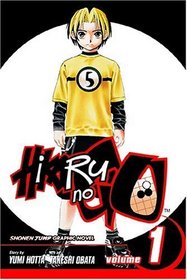i got this book and got half the way threw but then i started liking naruto so i stoped and put it on my book shelf.i got it 2 weeks ago and now im trading for naruto books!!!
Awesome Vol 1 that introduces the origins and some game play of the game, Go.
Hikaru shindo finds a magically go board while rummaging through his grandfather's attic. Out of the board comes Fujiwara-no-sai who was trapped in the board. Fujiwara is a go master who guides Hikaru through the game of go and even establishes a rival, Akira Toya
Hikaru shindo finds a magically go board while rummaging through his grandfather's attic. Out of the board comes Fujiwara-no-sai who was trapped in the board. Fujiwara is a go master who guides Hikaru through the game of go and even establishes a rival, Akira Toya
A good start to a good series, a classic example of a "coming-of-age" story, but Hikaru is not your typical "hero" fighting a battle of good versus evil... he's just a modern kid who gets haunted by the spirit of the master of an ancient board game, but is inspired to learn the game himself.
As he grows and trains, "battles" on the Go board against friends, enemies, and rivals abound. The entire 21-volume series takes Hikaru from a cocky, clumsy middle-schooler to a young professional Go player representing Japan on the world stage.
Overall, this is a methodically-researched, carefully-crafted, meticulously written series. The visuals by Obata (who also illustrated "Death Note") never disappoint. The unconventional ending, while disappointing in some ways, reveals the author's mastery of her craft.
Spoiler alert: Hikaru's mentor suffers a similar fate to that of many mentors in "coming-of-age" stories... but it's even sadder than usual. So if you really get to like his mentor, stop reading when you finish volume 11; you'll still enjoy a complete story, and avoid the eventual disappointment in that regard.
As he grows and trains, "battles" on the Go board against friends, enemies, and rivals abound. The entire 21-volume series takes Hikaru from a cocky, clumsy middle-schooler to a young professional Go player representing Japan on the world stage.
Overall, this is a methodically-researched, carefully-crafted, meticulously written series. The visuals by Obata (who also illustrated "Death Note") never disappoint. The unconventional ending, while disappointing in some ways, reveals the author's mastery of her craft.
Spoiler alert: Hikaru's mentor suffers a similar fate to that of many mentors in "coming-of-age" stories... but it's even sadder than usual. So if you really get to like his mentor, stop reading when you finish volume 11; you'll still enjoy a complete story, and avoid the eventual disappointment in that regard.




![header=[] body=[Get a free book credit right now by joining the club and listing 5 books you have and are willing to share with other members!] Help icon](/images/question.gif?v=29befa08)
